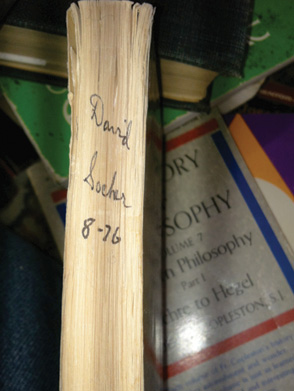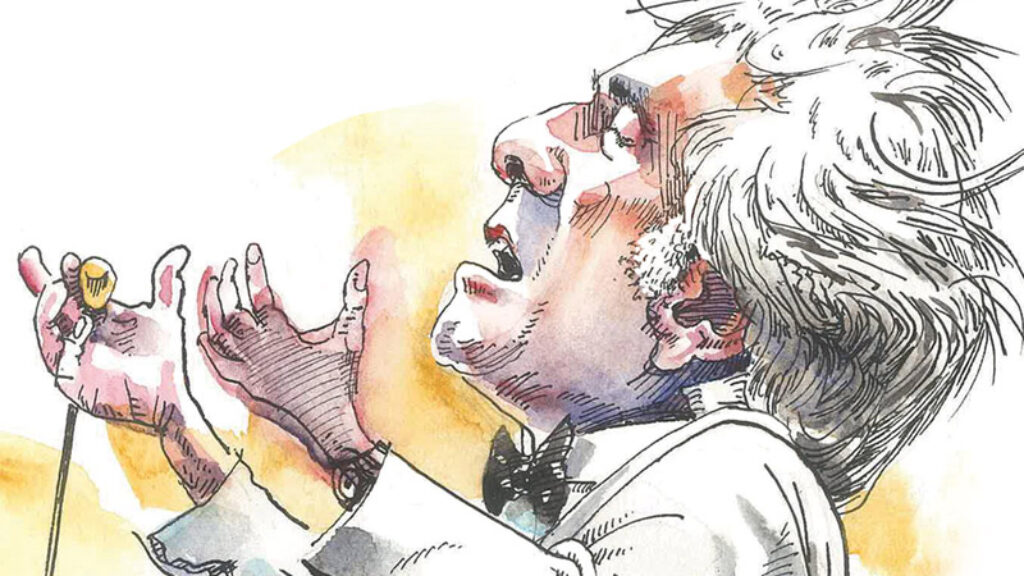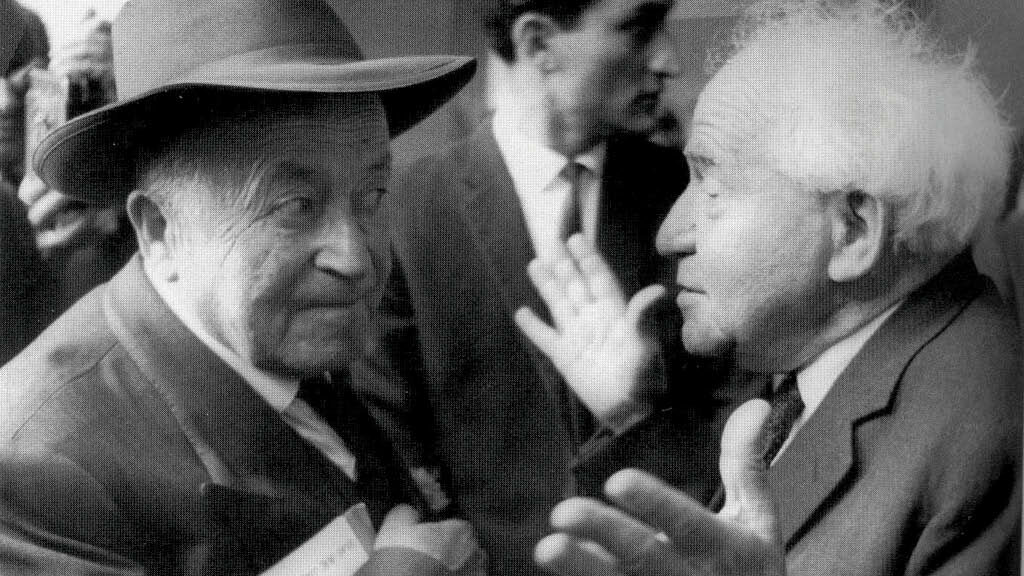The Digression
A doctor walks into the examination room and tells his patient that the drugs aren’t working and there isn’t anything else to try.
Doctor: You’ll be taken off all medication and restricted to a diet of flapjacks and flounders.
Patient: [With hope] Is that some kind of special diet?
Doctor: No—just the only food thin enough for the nurse to slide under your door.
My father, David Socher, alav ha-shalom (or as he would have pronounced it in his L.A.-Ashkenazi accent, olive ha-sholom—though no one ever pronounces that peace upon himself), loved that joke. Five years ago when the oncologist uttered the word “hospice” and fled the room, my dad turned to me and my mother and said “Well . . . flapjacks and flounders.”
The last three months had been a sudden, long fall. I had read Homer with my son Coby in the summer before 10th grade, and during my father’s illness I sometimes thought of what Hephaestus said about Zeus hurling him down from the heavens: “All day long I fell.” Of course, he was Zeus’ son and it was my father who was falling, falling.
I asked him if there was anything he felt was left unfinished or that he wanted to do. It felt trite and unlike us but also important to ask. He was weak and grey from the chemo, but also uncharacteristically nervous, jiggling his legs up and down like a runner before a race. “Well,” he said, “I can’t remember which part of the dialogue in the Theaetetus is the part that the Plato guys call ‘The Digression.’”
My father’s mind caught fire in 1960. In an Intro to Philosophy course at San Fernando Valley State, Donald Henze read a passage aloud from the first chapter of Bertrand Russell’s The Problems of Philosophy:
[I]f we take any common object of the sort that is supposed to be known by the senses, what the senses immediately tell us is not the truth about the object as it is apart from us . . . what we directly see and feel is merely “appearance,” which we believe to be a sign of some “reality” behind. But if the reality is not what appears, have we any means of knowing whether there is any reality at all?
Then Henze paused a beat and said “kind of spooky, huh?” and my dad was hooked. Although he didn’t end up getting a PhD and never worked as an academic philosopher, it is almost impossible for me to imagine what he was like before then.
My mother moved this summer and I’ve been packing up my father’s books: most of the classics of Western philosophy, those great Doubleday Anchor paperbacks of the 1950s and 1960s, the little Fontana Modern Masters books from the 70s, the works of Wittgenstein, commentaries on Wittgenstein, Wittgensteinian commentaries on others, virtually all of the must-reads of 20th-century analytic philosophy, multiple copies of the little Dover Thrift Editions he loved to teach from (The Hound of the Baskervilles, Flatland)—many of them with his notes, both discriminating and indiscriminate.
 My father was not easy on his books. He often wrote his name across the outer edge of their pages along with the date of purchase, so that you separated and re-formed the letters as you opened and closed them. (I used to worry that this made them forbidden to read on Shabbos.) He read his books in the bath, kept them on the floor of his car, set hot coffee cups on them, jotted cryptic notes on their pages. Sometimes a title page or back cover was just the handiest piece of paper (in Aesthetics: An Introduction by Ruth L. Saw he wrote “Loan Officer” and a number in the 818 area code).
My father was not easy on his books. He often wrote his name across the outer edge of their pages along with the date of purchase, so that you separated and re-formed the letters as you opened and closed them. (I used to worry that this made them forbidden to read on Shabbos.) He read his books in the bath, kept them on the floor of his car, set hot coffee cups on them, jotted cryptic notes on their pages. Sometimes a title page or back cover was just the handiest piece of paper (in Aesthetics: An Introduction by Ruth L. Saw he wrote “Loan Officer” and a number in the 818 area code).
Among the deeply familiar books (the furniture of my childhood) I found while sorting and packing were two identical paperback copies of Santayana’s little book Three Philosophical Poets. One copy was his mother’s—my Nana’s—copy, probably from when she went back to school in the ’50s. On the inside cover of the copy he’d later bought himself he wrote “p. 19: ‘It is always the fleeting moment in which we live.’” Of course most of his annotations don’t deliver that kind of retrospective punch. A yellow Post-it in David Roochnik’s Of Art and Wisdom: Plato’s Understanding of Techne reads:
Sacajawea was born in 1787 AD.
Socrates was executed in 399 BC.
∴ Sacajawea and Socrates never had lunch.
My guess is that this was a note about the logical function of time in certain arguments—what kind of necessity was involved in that “therefore.” Also, he was a wise guy.
His dog-eared copy of Timothy Chappell’s annotated translation of Plato’s Theaetetus is heavily marked up. On page 9, he’s jotted down a list of those “Plato guys”: Cornford, Bostic, Burnyeat, McDowell, Sosa, Sedley, . . . [indecipherable]. It’s hard not to make each surviving trace of one’s dead parent a relic, to imagine that my father is himself scattered among these hundreds of books, piled on the floor of an empty house.
When I was about 15, he briefly tried to become an insurance salesman. I don’t know how long this lasted and I’m fairly sure that he never sold a policy, but there was some drama around a visit from two of his new colleagues at Prudential. Not only did the house need to be (relatively) neat, but my father was worried that the number of books, magazines, and journals in the living room might not hit the right note. We packed a few boxes and put them in the garage. When the insurance salesmen arrived, my dad got some beers out and the three of them stood around making awkward chit-chat. “Wow,” they kept saying as they stared at all the remaining books, the casual untidiness of our living room, my mother’s tomato plants in the front yard, “this sure is California living.”
When we got home from the hospital, my father was too weak to read, but the next day, or maybe the day after that, I brought the Theaetetus over. Plato frames the dialogue as a record of conversations that took place decades earlier and are being read now because Theaetetus is dying after the battle of Corinth. I don’t know whether this was in the back of my father’s mind (or at the front of it) in that moment in the oncologist’s office. Before he was diagnosed, he had been writing his own parallel dialogue in which a dying Theaetetus reassesses Socrates’ arguments about the nature of knowledge (“Socrates has loaded the dice, if I may say so, Imendides”). So he might have been wondering if he had time to finish his dialogue, when he asked about “The Digression.”
That digression begins at line 172c1. Socrates says that philosophers tend to look awkward and ridiculous in courts of law, civic assemblies, committee meetings, and parties. They are like Thales, who gazed at the heavens and fell in a well to the amusement of a Thracian girl. However, Socrates soon shows that when unphilosophical men who excel in such settings are “dragged upwards” into discussions of what really matters, they find themselves looking ridiculous. Then Socrates pushes a little harder. Suppose, he says, that we tell such men that the “region which is untainted by evils will not receive them even when they die,” for they have been unconcerned with the eternal patterns of goodness while they lived. So maybe my father had been trying to remember this line when he asked his question. It was certainly a hard sentence to read to him in the fleeting moment.
Then again, my father was at the very end of a good, modest, thoughtful life and was, in any case, untempted by Plato’s heaven. On the title page of McDowell’s translation of the Theaetetus, which I have just reopened, I wrote “p. 54: Dad-Digression-Flapjacks-Heaven.”
Suggested Reading
Tradition, Creativity, and Cognitive Dissonance
What are the conditions for a Jewish intellectual renaissance? Disagreement is one, inconsistency might be another; look at the early Zionists.
From the Middle to the End
A deceptively simple novel about a suburban, Midwestern Jewish family catapults into something annoyingly profound.

Kaddish for the Maestro
Maestro doesn't quite succeed at capturing the extraordinary life and genius of Leonard Bernstein, but it is an opportunity to recall an era in both American Jewish and musical history that will never be repeated.

“The Secret of Our Army’s Endurance”
"I think the army is nothing to play around with, but dabbling in pacifism is a bad business."
Comments
You must log in to comment Log In